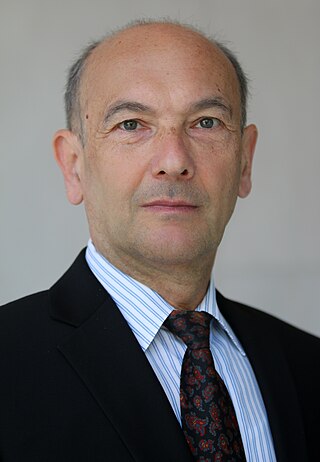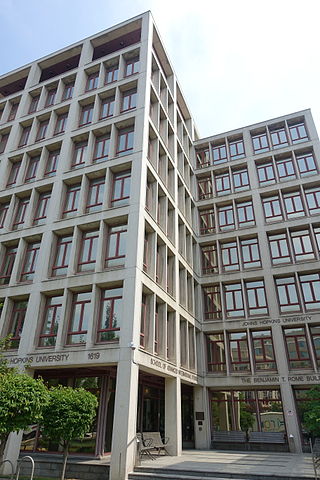Related Research Articles

The Paul H. Nitze School of Advanced International Studies (SAIS) is a graduate school of Johns Hopkins University based in Washington, D.C. with campuses in Bologna, Italy and Nanjing, China.
Béla Alexander Balassa was a Hungarian economist who served as a professor at Johns Hopkins University, and was a consultant to the World Bank.

A remittance is a non-commercial transfer of money by a foreign worker, a member of a diaspora community, or a citizen with familial ties abroad, for household income in their home country or homeland. Money sent home by migrants competes with international aid as one of the largest financial inflows to developing countries. Workers' remittances are a significant part of international capital flows, especially with regard to labor-exporting countries.

Pratap Bhanu Mehta is an Indian academician. He was the president of the Centre for Policy Research, a New Delhi-based think tank and was the Vice-Chancellor of Ashoka University from July 2017 to July 2019.
Stephen Frederick Starr is an American expert on Russian and Eurasian affairs, a musician, and a former president of Oberlin College.

Vali Reza Nasr is an Iranian-American academic and author, specializing in the Middle East and the Islamic world. He is Majid Khaddouri Professor of International Affairs and Middle East Studies at the Johns Hopkins School of Advanced International Studies (SAIS) in Washington, D.C. He served as the eighth dean of the school from 2012 to 2019. Nasr is also a Non-Resident Fellow in South Asia at Atlantic Council and is described by The Economist as "a leading world authority on Shia Islam".

Michael Jonathan Green is an American Japanologist currently serving as CEO of the United States Studies Centre and senior advisor at the Center for Strategic and International Studies (CSIS). He is also a member of Radio Free Asia's board of directors and Center for a New American Security (CNAS)'s board of advisors.
The Johns Hopkins University SAIS Europe in Bologna, Italy, is the European campus of the Paul H. Nitze School of Advanced International Studies (SAIS), a division of Johns Hopkins University located in Washington, D.C. SAIS degree programs emphasize international economics, international relations, EU policy and global risk with options to specialize in a broad range of other policy areas and geographic regions.

The Hopkins–Nanjing Center, formally the Johns Hopkins University–Nanjing University Center for Chinese and American Studies, is an international campus of the Paul H. Nitze School of Advanced International Studies and a joint educational venture between Johns Hopkins University and Nanjing University that opened in Nanjing, China, in 1986. Former Hopkins President Steven Muller and former NJU President Kuang Yaming worked together to create the center, recognizing the importance of improved understanding and relations between their respective countries. Muller believed China to be "the country of the future."

Anne Osborn Krueger is an American economist. She was the World Bank Chief Economist from 1982 to 1986, and the first deputy managing director of the International Monetary Fund (IMF) from 2001 to 2006. She is currently the senior research professor of international economics at the Johns Hopkins School of Advanced International Studies in Washington, D.C. She also is a senior fellow of Center for International Development and the Herald L. and Caroline Ritch Emeritus Professor of Sciences and Humanities' Economics Department at Stanford University.
The Central Asia-Caucasus Institute or CACI was founded in 1996 by S. Frederick Starr, a research professor at Johns Hopkins University's School of Advanced International Studies. He has served as vice president of Tulane University and as president of Oberlin College (1983–1994) and the Aspen Institute. He has advised three U.S. presidents on Russian/Eurasian affairs and chaired an external advisory panel on U.S. government-sponsored research on the region, organized and co-authored the first strategic assessment of Central Asia, the Caucasus and Afghanistan for the Joint Chiefs of Staff in 1999, and was involved in the drafting of recent U.S. legislation affecting the region.
Myron Weiner was an American political scientist and renowned scholar of India, South Asia, internal and international migration, ethnic conflict, child labor, democratization, political demography, and the politics and policies of developing countries.
Sunil Khilnani is a professor of politics and history at Ashoka University, India. Previously, he was a professor of politics and the Director of the King's College London India Institute. He is a scholar of Indian history and politics best known as the author of The Idea of India (1997). He was the presenter of a BBC Radio 4 series entitled Incarnations: India in 50 Lives, which was later published as a book in 2016. He was a 2010 Berlin Prize Fellow, and he was also a recipient of the Indian government's 2005 Pravasi Bharatiya Samman award.

The Jains in Belgium are estimated to be around about 1,500 people.
Kent E. Calder was the interim dean of the Johns Hopkins School of Advanced International Studies (SAIS), serves as the director of the Edwin O. Reischauer Center for East Asian Studies, and is also the Edwin O. Reischauer Professor of East Asian Studies at SAIS. Calder previously served as the vice dean for faculty affairs and international research cooperation at SAIS.

Igor Alexandrovich Zevelev is a Russian political scientist.

The Foreign Policy Institute (FPI) is an American research center based at The Johns Hopkins University's Paul H. Nitze School of Advanced International Studies (SAIS) in Washington, D.C., United States. The Institute, referred to as FPI, is housed in the Benjamin T. Rome building on the Embassy Row in Washington, D.C. FPI organizes research initiatives and study groups, and hosts leaders from around the world as resident or non-resident fellows in fields including international policy, business, journalism, and academia.
The Princeton Institute for International and Regional Studies (PIIRS) is the main research center for international studies and area studies at Princeton University and is one of the oldest centers of its kind in the United States. The Institute focuses on an interdisciplinary approach and its associated faculty is drawn from more than 150 professors and other scholars from more than 25 different departments within Princeton. Its director is political scientist Deborah J. Yashar, the Donald E. Stokes Professor of Public and International Affairs.
Cornelius C. Kubler is an academic in the disciplines of Chinese Linguistics and Chinese Language Pedagogy, an expert in Chinese dialects, and a polyglot who speaks twelve languages including English, German, Mandarin, Taiwanese, Cantonese and Japanese. He is the Stanfield Professor of Asian Studies at Williams College, former American Co-Director of the Johns Hopkins University-Nanjing University Center for Chinese and American Studies in Nanjing, China, and a former American diplomat.
Sergey S. Radchenko is a Soviet-born British-Russian historian. He is the Wilson E. Schmidt Distinguished Professor at the Henry A. Kissinger Center for Global Affairs, Johns Hopkins School of Advanced International Studies, and visiting professor at Cardiff University. He has served as a Reader at Aberystwyth University, a Global Fellow and a Public Policy Fellow at the Woodrow Wilson Centre, and as the Zi Jiang Distinguished Professor at East China Normal University (Shanghai).
References
- 1 2 "Devesh Kapur Joins Johns Hopkins SAIS as Director of Asia Programs". 4 September 2018. Retrieved 12 February 2019.
- 1 2 3 4 5 "Devesh Kapur". Center for the Advanced Study of India. 20 September 2013. Retrieved 3 June 2014.
- ↑ "Devesh Kapur" . Retrieved 3 June 2014.
- ↑ "Devesh Kapur" . Retrieved 3 June 2014.
- 1 2 3 "Devesh Kapur". Center for Global Development . Retrieved 3 June 2014.
- ↑ "Devesh Kapur" . Retrieved 3 June 2014.
- ↑ "Devesh Kapur". Project Syndicate . Retrieved 3 June 2014.
- ↑ "Why are British Indian voters abandoning Labour?". theguardian.com. The Guardian. 18 November 2021. Retrieved 6 June 2024.
- ↑ Kapur, Devesh (4 June 2024). "Modi's Power Has Peaked". foreignpolicy.com. Retrieved 6 June 2024.
- ↑ Kapur, Devesh (2 August 2010). Diaspora, Development, and Democracy: The Domestic Impact of International Migration from India. Princeton University Press. ISBN 9781400835089.
- ↑ "Books by Devesh Kapur". Amazon.com . Retrieved 3 June 2014.
- ↑ Kapur, Devesh (25 August 2003). "Remittances: The New Development Mantra?" (PDF). Retrieved 3 June 2014.
- ↑ DeParle, Jason (17 March 2008). "World Banker and His Cash Return Home" . The New York Times . Retrieved 28 May 2014.